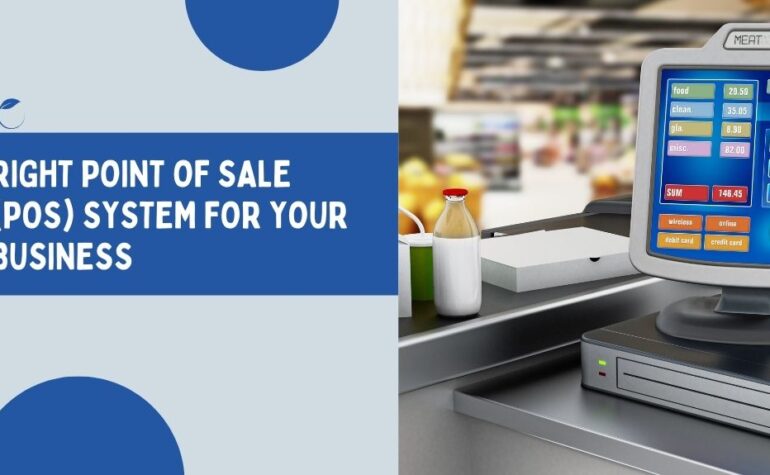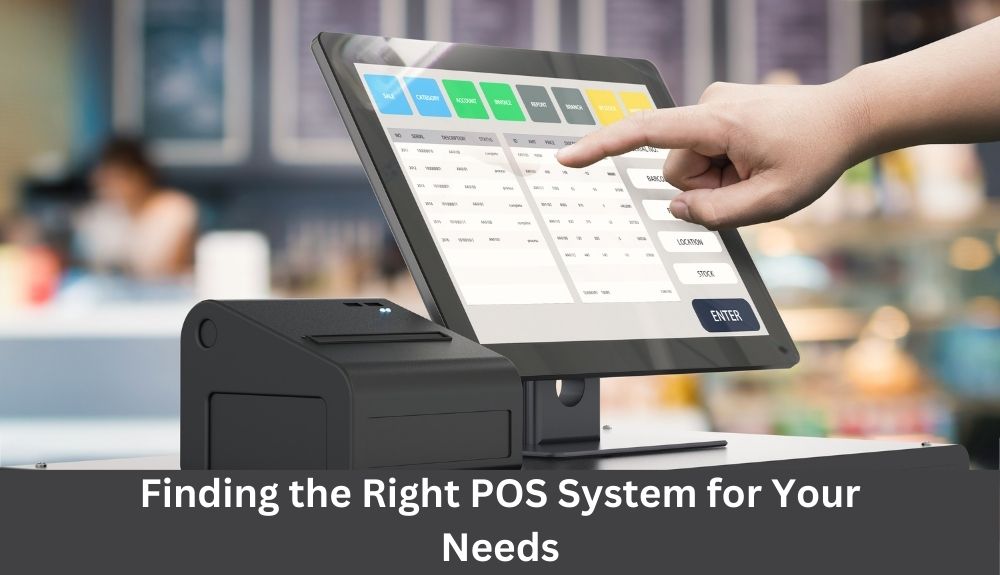Best Credit Card Processing Solutions Tailored for Every Industry

By merchantservices February 9, 2024
Are you a business owner looking to streamline your operations and enhance customer experiences? Choosing the right Point of Sale (POS) system is a critical step in achieving these goals. With the market flooded with countless options, it can be overwhelming to make the right choice. But fear not, because we are here to guide you through the process.
In this comprehensive guide, we will walk you through the key considerations when selecting a POS system for your business. From inventory management and staff empowerment to personalized experiences and reporting analytics, we will cover it all. We’ll also delve into the importance of online and retail store synchronization, embedded payments, targeted marketing, and scalability.
By the end of this article, you’ll have a 10-point checklist that will help you make an informed decision about the right POS system for your specific business needs. Don’t let this critical business decision be daunting. Let us empower you with the knowledge to choose a POS system that will support your growth and take your business to the next level.
Introduction to Choosing a POS System
Selecting the right Point of Sale (POS) system is a critical decision for any retail business. The POS system not only handles transactions but also plays a vital role in streamlining operations, managing inventory, and gathering valuable insights. With numerous POS options available in the market, making an informed choice can significantly impact a business’s success.
Choosing a suitable POS system can enhance a business’s credibility, competitiveness, and sales tracking capabilities. It allows retailers to efficiently process transactions, manage inventory levels, and gain real-time visibility into business operations. Moreover, a well-designed POS system facilitates accurate reporting and analytics, empowering businesses to make data-driven decisions.
In this article, we will explore the key considerations when selecting a POS system for your retail business. We will delve into factors such as ease of use, integration capabilities, software features, hardware requirements, support, cost, and the reputation of the POS vendor. By the end of this guide, you will be equipped with the knowledge necessary to choose a POS system that aligns with your business needs and supports your growth.
Let’s dive into the essential aspects you need to consider when evaluating different POS systems.
What Is a POS System – and Why Do You Need One?
A point of sale (POS) system is a software and hardware combination that allows businesses to process transactions, manage sales, and track inventory. It serves as the central hub for retail operations, integrating various functions such as sales tracking, inventory management, payment processing, and customer relationship management.
The importance of a POS system for retail businesses cannot be understated. It offers numerous benefits, starting with enhanced credibility. When customers see a professional and efficient checkout process, their perception of the business improves. A modern and streamlined POS system instills trust and confidence in buyers, increasing the chances of repeat business and positive word-of-mouth referrals.
Competitiveness is another key advantage of a POS system. In today’s fast-paced retail environment, efficiency is critical. A well-implemented POS system enables businesses to process transactions swiftly and accurately, reducing wait times and ensuring a seamless customer experience. This can give retailers an edge over competitors who still rely on manual cash registers or outdated systems.
Sales tracking is another crucial aspect offered by POS systems. By accurately capturing and analyzing sales data, businesses gain valuable insights into their performance. They can identify top-selling products, measure revenue by category, and track customer preferences. This information helps retailers make data-driven decisions, optimize their inventory, and identify growth opportunities.
In summary, a POS system is the central nervous system of a modern retail business. It enhances credibility, competitiveness, and sales tracking capabilities. By streamlining operations and providing valuable insights, it enables retailers to deliver excellent customer experiences and drive business growth. Investing in the right POS system is a critical step for any retail business looking to thrive in today’s dynamic market landscape.
Finding the Right POS System for Your Needs

When it comes to finding the right POS system for your retail business, it’s important to assess your specific needs and consider the tasks that can be simplified with the help of a POS system. By asking yourself a few key questions about your current state and struggles, you can gain clarity on the features and functionalities that are essential for your business operations.
1. What are your current pain points?
– Identify the specific challenges you face in your day-to-day operations. Is it inventory management? Streamlining sales tracking? Improving customer experience? Pinpointing your pain points will guide you in selecting a POS system that addresses these areas of improvement.
2. What tasks can be simplified or automated?
– Take note of the manual tasks that are time-consuming and prone to human error. Are you spending valuable hours on manual inventory counts or reconciling sales data? Look for a POS system that offers automation features for these tasks, saving you time and reducing the risk of errors.
3. How scalable is your business?
– Consider the future growth and expansion plans of your business. Will your POS system be able to accommodate increased inventory, staff, and sales volume? It’s important to choose a POS system that can scale with your business, allowing for seamless growth without the need for frequent system upgrades.
4. What level of support do you require?
– Evaluate the level of support you need from your POS system provider. Do you prefer a vendor that offers 24/7 customer support? Are you comfortable with self-help resources and online documentation? Assess your support needs to ensure you have the necessary assistance when required.
5. What is your budget?
– Determine your budget for a POS system, taking into account both upfront costs and ongoing fees. Consider any additional hardware or software requirements, as well as any potential integration costs. It’s important to strike a balance between affordability and the features you require.
Remember, finding the right POS system is a critical step in optimizing your retail business operations. By assessing your needs and asking the right questions, you can make an informed decision that aligns with your specific requirements and sets your business up for success.
Things to Consider When Looking for a POS System
When searching for the right point of sale (POS) system for your business, it’s essential to consider several factors that can greatly impact your operations. Here are some key considerations to guide you in making an informed decision:
1. Ease of Use
A user-friendly interface and intuitive navigation are crucial for ensuring a seamless checkout experience. Look for a POS system that can be easily adopted by your staff with minimal training.
2. Hardware and Software Compatibility
Ensure the POS system you choose is compatible with your existing hardware, such as barcode scanners, receipt printers, and cash drawers. Additionally, consider the software requirements and whether it integrates well with your other business systems.
3. Integration Capabilities
Opt for a POS system that can integrate with other essential tools you use, such as inventory management software, accounting systems, and customer relationship management (CRM) platforms. This enables streamlined operations and eliminates manual data entry.
4. Automation Features
Look for automation features that can save time and increase efficiency, such as inventory tracking, automated purchase order generation, and employee scheduling. Automation can help reduce errors and free up time for more strategic tasks.
5. PCI Compliance and Security
Ensure that the POS system you choose is Payment Card Industry Data Security Standard (PCI DSS) compliant to protect customer payment information. Robust security features, such as encrypted transactions and user access controls, are essential to safeguard your business and customer data.
6. Support and Maintenance
Consider the level of support provided by the POS system vendor. Check if they offer technical support, software updates, and troubleshooting assistance. Reliable customer support can be crucial during critical business hours.
7. Cost and Pricing
Evaluate the pricing structure, including any upfront costs, monthly fees, and transaction fees. Consider your budget and the long-term scalability of the system. Different POS providers offer various pricing models, so compare the costs and benefits.
8. Features and Customization
Assess the POS system’s features and ensure they align with your specific business requirements. Look for customization options that allow you to tailor the system to your unique business needs.
9. Reputation and Reviews
Research the reputation of the POS system vendor. Read reviews from other users and seek out references from businesses in your industry. A reputable vendor with positive reviews can provide peace of mind and reliable service.
By considering these essential factors, you can narrow down your options and select a POS system that best meets your business needs. Remember, investing time and effort into choosing the right POS system is a critical step towards optimizing your operations and driving business growth.
Picking the Best POS System for Your Business
When it comes to selecting the best POS system for your business, it’s crucial to consider various factors that align with your specific needs. Here are some recommendations to guide you in making an informed decision:
1. Identify your business type: Different industries have unique requirements. Retail stores may benefit from a feature-rich system that includes inventory management, while restaurants may need a POS with table management and kitchen integration capabilities. Determine the specific needs of your business to narrow down your options.
2. Set a budget: POS systems come at different price points, so it’s essential to consider your budget. While cost is a significant factor, ensure that the system’s features and capabilities align with your requirements. Remember, the cheapest option may not always provide the functionality you need, so find a balance between affordability and functionality.
3. Scalability: Consider the future growth plans of your business. Choose a POS system that can easily scale as your operations expand. Look for solutions that offer additional features, integrations, and the flexibility to accommodate increasing transaction volumes.
4. Get references and trials: Before finalizing your decision, seek references from other businesses in your industry or from the POS vendor directly. This will give you insights into the reliability of the system and the vendor’s level of customer support. Additionally, take advantage of trial demos to test-drive potential POS systems and determine if they meet your specific needs.
Remember, selecting a POS system is a critical step that can impact your business operations and growth. By considering the type of business, budget constraints, scalability, and obtaining references or trial demos, you can make an informed decision that will support your business’s success.
Optimizing Your POS System for Maximum Business Growth
Once you’ve chosen the right POS system for your retail business, it’s essential to leverage its capabilities to maximize your business growth opportunities. Here are some strategies to optimize your POS system:
1. Leverage Business Insights
Take advantage of the reporting and analytics features of your POS system to gain valuable insights into your business performance. Analyze sales data, inventory turnover rates, and customer purchasing patterns to identify trends and make informed decisions. Use this information to optimize your product offerings, improve inventory management, and target your marketing efforts effectively.
2. Explore Additional Apps and Add-Ons
Many POS systems offer a range of additional apps and add-ons that can enhance your business operations. Consider integrating third-party apps for functions such as email marketing, loyalty programs, and employee scheduling. These integrations can streamline workflows, improve customer engagement, and boost overall productivity.
3. Enhance Customer Experiences
Your POS system can play a vital role in providing excellent customer experiences. Utilize features such as personalized rewards programs, targeted promotions, and easy checkout processes to create a seamless and enjoyable shopping experience for your customers. Streamline the purchasing journey and ensure that your POS system supports multiple payment options, including mobile payment methods and contactless payments.
4. Stay Up-to-Date with System Updates
Regularly update your POS system with the latest software releases and patches. These updates often include bug fixes, security enhancements, and new features that can optimize system performance and protect your business from vulnerabilities. Stay proactive in maintaining a secure and efficient POS system by promptly implementing updates.
5. Train Staff on System Features
Ensure that your staff is well-trained on utilizing your POS system’s features to their full potential. Provide comprehensive training sessions and ongoing support to ensure that employees can leverage the system effectively. Encourage them to explore features such as item lookup, gift card management, and advanced reporting to optimize their workflow and boost overall efficiency.
Optimizing your POS system is a critical step towards achieving maximum business growth. By leveraging business insights, exploring additional apps and add-ons, and enhancing customer experiences, you can unlock the full potential of your POS system and drive your retail business towards success.
Remember to regularly evaluate your POS system’s performance and adapt your optimization strategies to align with changing business needs and goals. By staying proactive and continually optimizing your POS system, you can stay ahead of the competition and fuel sustainable business growth.
Let Us Help You Find the Right POS System for You

Finding the right POS system for your business can be a critical step towards streamlining operations and maximizing growth. If you’re feeling overwhelmed by the multitude of options available, don’t worry – we’re here to help. With our expertise in the retail industry and deep knowledge of POS systems, we can guide you towards the perfect solution that aligns with your specific needs.
By subscribing to our newsletter, you’ll gain access to valuable insights and tips on how to choose and optimize a POS system for your business. Our team of experts stays up-to-date on the latest trends and technologies in the industry, ensuring that we provide you with the most relevant and valuable information.
Whether you’re a small business owner looking to upgrade your current system or a new business owner starting from scratch, our resources can assist you in making an informed decision. We understand that every business is unique, and we take into account factors such as budget, scalability, and specific business requirements when recommending the right POS system for you.
Don’t navigate the complex landscape of POS systems alone. Let us be your trusted partner in finding the ideal solution to propel your business forward. Subscribe to our newsletter now for exclusive insights and expert advice on finding the right POS system for you.
Remember, choosing the right POS system is not just a business decision – it’s a strategic investment in your success. Let us help you make the right choice.
